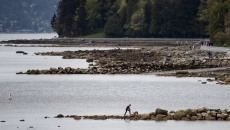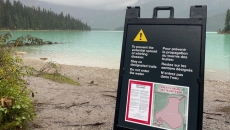Canada has yet to set a date for the North American Leaders' Summit, but Prime Minister Justin Trudeau says he's still aiming to host the gathering this year.
The summit has happened most years since 2005, and hosting duties rotate between Canada, the U.S. and Mexico for meetings that focus on transnational issues such as immigration and drug trafficking.
Canada agreed in January 2023 to host the next summit, and Mexican Foreign Affairs Minister Alicia Bárcena said in February that it would take place in Quebec in April.
"Canada has not yet confirmed the date or the location of the next summit," Global Affairs Canada wrote in a statement.
Mexico heads to the polls on June 2, while the U.S. election takes place Nov. 5, and Trudeau said Thursday it's been tricky navigating that schedule.
"It's a little more challenging to pull together the Three Amigos summit, but we still intend to hold it in 2024," he told reporters in Caraquet, N.B.
"Getting together to work on common issues is a huge priority. We continue to work bilaterally on a number of issues."
While it is important that the summit happen, it's also understandable "that it might just get pushed out a little bit," said Bruce Heyman, U.S. ambassador to Canada during the Obama administration.
"It's going to be important that Canada, Mexico and the U.S. find ways to protect this relationship, which I think under Trump 2.0 would be very, very difficult."
Heyman said the summit is a "critical format" to get countries on the same page around issues such as manufacturing, the environment and supply chains. He said the looming 2026 review of the trade deal that replaced NAFTA shouldn't affect the next summit.
Yet he argued that a meeting before November would help countries set plans to limit the effect of policies that could harm relations if Donald Trump is elected in the U.S. on his pledges to implement trade and border restrictions, and to scrap certain environmental protections.
"Some things that we agreed to as a country can be rolled back under an adversarial-type administration," Heyman said. He advocates putting U.S.-Canada issues into laws and treaties that would "future-proof" policies and make them harder for a Trump administration to repeal.
"It's important to do that, but we're running short on time to be able to implement those things," he said.
Canada chairs the G7 next year, meaning it will host a series of ministerial meetings in 2025 and a leaders' summit for the bloc, which represents like-minded rich countries.
The Mexican Embassy in Ottawa noted that whichever president Mexico elects will be a new leader who takes office in September, and so it "could be complicated" to hold a summit during the summer months.
The U.S. Embassy in Ottawa says it looks forward to working on numerous issues when the summit does take place.
"This includes work to deepen our economic co-operation, promote investment, and reinforce competitiveness, innovation, and resilience; combat the climate crisis; champion expansion of legal pathways and other humane measures to address irregular migration in the region; and combat arms and drug trafficking, as well as trafficking in persons," a spokeswoman wrote.
Heyman noted that the trilateral summit has always been more ad hoc than meetings like the G20 or NATO military alliance. For example, Mexico delayed its hosting of the 2022 summit into January 2023.
During Trump's four years as president, he refused to have the summit take place. Former prime minister Stephen Harper postponed the 2015 summit amid tensions over the Obama administration delaying construction of the Keystone XL pipeline.
Canada similarly postponed a 2010 summit, while Mexico had the 2011 gathering postponed after the death of a politician.
In late February, Mexican President Andres Manuel López Obrador threatened to boycott the summit "if there is no respectful treatment" of Mexico. He cited Ottawa's decision to reimpose a visa requirement on Mexican citizens, as well as a New York Times report about a preliminary American probe into alleged gang ties with his affiliates.
On March 8, López Obrador said he figured it was too late to have the summit ahead of the two elections.
"I believe that it will no longer be my responsibility to attend the summit," he said in Spanish at a press conference. "But whoever replaces me will surely attend, because we need to maintain our economic and commercial relations with Canada and the United States."






